

Valarie907 : Proud to be part of the amazing... The Wrong Love. Much is written about love and libraries. There is ILoveLibraries.org, a site created by the American Library Association. The site does many things toward library and librarian advocacy, including the I Love My Librarian award. There is also the Love Libraries website run out of the UK, promoting UK libraries.
Librarianship, information, the universe and me. The Importance of Professionalism. Editor’s Note: This is a guest post by Katie Clausen.
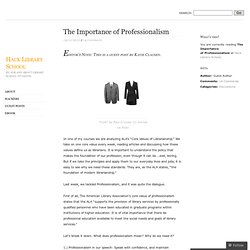
“Suits” by Paul G under CC license via flickr. Earning Trust. Earning the trust of your library members is crucial to delivering a great user experience.
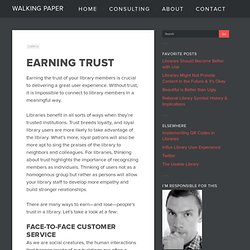
Without trust, it is impossible to connect to library members in a meaningful way. Libraries benefit in all sorts of ways when they’re trusted institutions. Untitled. Title: AN OVERVIEW OF SENSE-MAKING RESEARCH: CONCEPTS, METHODS, AND RESULTS TO DATE Author: Brenda Dervin, Ph.D.
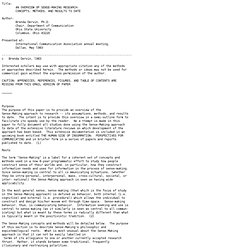
Chair, Department of Communication Ohio State University Columbus, Ohio 43220 Presented at: International Communication Association annual meeting, Dallas, May l983 ---------------------------------------------------------------------------- c Brenda Dervin, l983 Interested scholars may use with appropriate citation any of the methods or approaches described herein. The methods or ideas may not be used for commercial gain without the express permission of the author. CAUTION: APPENDICES, REFERENCES, FIGURES, AND TABLE OF CONTENTS ARE MISSING FROM THIS EMAIL VERSION OF PAPER ______ Purpose The purpose of this paper is to provide an overview of the Sense-Making approach to research -- its assumptions, methods, and results to date. Untitled. FROM THE MIND'S EYE OF THE 'USER': THE SENSE-MAKING QUALITATIVE-QUANTITATIVE METHODOLOGY by Brenda Dervin Department of Communication 205 Derby Hall 154 N.

Oval Mall Ohio State University Columbus, Ohio 43210 614-292-3400 work 614-442-0721 home 614-292-2055 fax This is the originally submitted version of the chapter published as follows: Dervin, Brenda (1992). From the mind's eye of the user: the sense-making qualitative-quantitative methodology. In Jack D. Glazier and Ronald R. The Design of Browsing and Berrypicking Techniques. The classic model of information retrieval (IR) used in information science research for over twenty-five years can be characterized as follows (Compare Robertson [3], especially p. 129): This model has been very productive and has promoted our understanding of information retrieval in many ways.
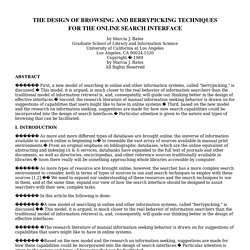
However, as Kuhn [4] noted, major models that are as central to a field as this one is, eventually begin to show inadequacies as testing leads to greater and greater understanding of the processes being studied. The limitations of the original model's representation of the phenomenon of interest become more and more evident. Carol Kuhlthau. In the first stage, initiation, a person becomes aware of a gap in knowledge or a lack of understanding, where feelings of uncertainty and apprehension are common.
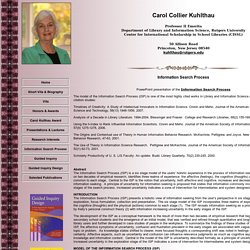
At this point,the task is merely to recognize a need for information. Thoughts center on contemplating the problem, comprehending the task, and relating the problem to prior experience and personal knowledge. Actions frequently involve discussing possible avenues of approach or topics to pursue. Welcome to Library and Information Science - Home. The Invisible Substrate of Information Science by Sarah Hakkarinen on Prezi. Afzal - afzal.pdf. Portal:Library and information science. Getting Started in the Profession: New Info Pros Share Their Best Career Advice - 03-06-2014 : ME... METRO.
By Ellen Mehling, Career Development Consultant, METRO Usually I am the one answering job search and career-related questions; this time I’m the one posing a question to some recent graduates in the first few years of their information professional careers.
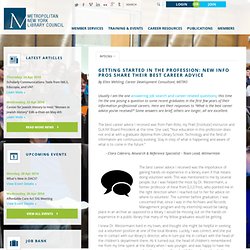
Here are their responses to “What is the best career advice you’ve received?” Some answers are brief, others are longer, all are excellent. Users Don’t Know What Libraries Are Talking About, Studies Find. This article was updated to more accurately reflect UC Berkeley’s relationship to the document.
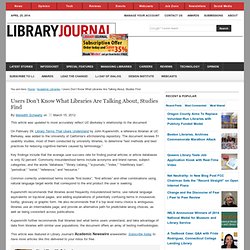
On February 29, Library Terms That Users Understand by John Kupersmith, a reference librarian at UC Berkeley, was added to the University of California’s eScholarship repository. The document reviews 51 usability studies, most of them conducted by university libraries, to determine “test methods and best practices for reducing cognitive barriers caused by terminology.” Key findings include that the average user success rate for finding journal articles or article databases is only 52 percent. Commonly misunderstood terms include acronyms and brand names, subject categories, and the words “database,” “library catalog,” “e-journals,” “index,” “interlibrary loan”, “periodical,” “serial,” “reference,” and “resource.”
Stop Googling Around. By Brian R Smith on February 21, 2014 I began my New Year’s resolution to “quit Google” soon after the New Year’s holiday.
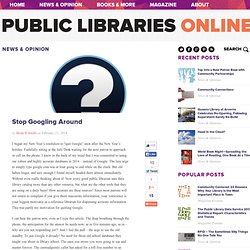
Faithfully sitting at the Info Desk waiting for the next patron to approach or call on the phone. The Four Habits of Highly Effective Librarians - Do Your Job Better. By Todd Gilman Last fall, when I wrote about why many academic librarians feel unappreciated on their campuses, I pointed to their relationships with professors as a major culprit.
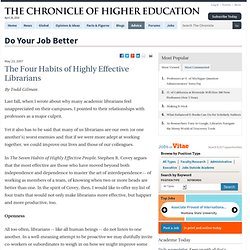
Yet it also has to be said that many of us librarians are our own (or one another's) worst enemies and that if we were more adept at working together, we could improve our lives and those of our colleagues. 1262 Photos, 36 Countries, and Two Years Later – This Is What A Librarian Looks Like. Today is the 2 year anniversary of the launch of This is What a Librarian Looks Like! Submissions have slowed down after the last year but we still added over 500 new photos! That’s right! How Will Your Organization Adjust? The game has changed. Tales of #InfoChaos - True Confessions of an Information Hoarder. Do not go to library school. Librarianship is a dying profession. Booksecret. 4 Universities Innovating in the EdTech World - Getting Smart by EdCetera Staff - EdTech, education, Highered, Online Learning.
Do You Struggle to Make Conversation? A Menu of Options for Small Talk. Too much information. Choose what to learn.Choose what to teach. I wasn’t born in Silicon Valley. I’ve earned my way in San Jose through hard work, good ideas, and what my English friends call cheekiness.